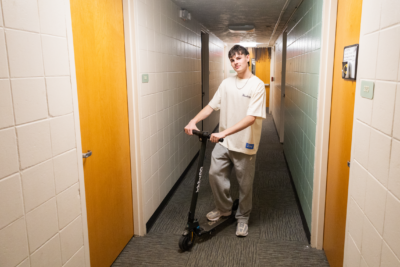In place of a receptionist, there’s a sticky note stuck to the front door that reads “Please Knock,” and there are toys in the small lobby for children to play with. There are big, inviting windows, and, most importantly, clients continue to stream in.
Koop, a Goshen College alum, works for the National Immigrant Justice Center (NIJC), a Chicago-based non-profit that provides affordable legal defense to immigrants and refugees.Koop began at the NIJC in 2006 and helped to open a Goshen branch in 2014, in addition to the South Bend and Chicago locations. The new office, located at 110 E. Washington St., opened in October.
Koop graduated from GC in 1999, taking away a double major in English and psychology and a commitment to social justice.
She joined Mennonite Voluntary Service (MVS) and ended up in Harlingen, Texas, a city 25 miles off of the U.S.-Mexico border. There she worked with the non-profit ProBAR to assist immigrants in detention who were arrested by border patrol after crossing into the country.
After two years with MVS, Koop came back to Indiana for law school, with a clear focus on immigration law.
“I didn’t think about law in undergrad,” says Koop. “I don’t think I had at that time a lot of people in my world who were attorneys. But through my Goshen experience I came away… with a love for reading and writing and critically analyzing things.”
Finishing a two-year fellowship at Notre Dame, Koop connected with the NIJC. Eleven years later, the ever-changing nature of the work has kept it compelling.
Koop began as a staff attorney, a position that brought her into court up to a couple times a week providing direct representation for clients. Direct services remains an important part of her work, but she now also supervises the NIJC’s asylum program, which works to provide protection for people who have fled their countries of origin due to persecution.
She has also added federal litigation work to her agenda, trying to favorably change interpretations of immigration laws through progress made in individual cases.
Additionally, Koop teaches a practicum course at Notre Dame, working with law students to expose them to immigration law.
Organizations doing work like the NIJC’s are few and far between, especially in Indiana. Clients travel from Indianapolis and Fort Wayne regularly, in part because they have to go to court in Chicago.
“Most of [our clients] probably couldn’t afford private attorneys, so that’s why they end up working with us,” says Koop, “You know how if you commit a crime and you can’t afford an attorney, then you’re assigned counsel? That’s not the case with immigration law—you don’t have an attorney unless you can find a pro bono attorney or unless you can hire one.”
In the context of the current presidential administration, it is more important than ever that immigrants facing deportation have access to legal representation.
“It’s been striking in the last couple of the months, the number of people who are unaware of the way immigration enforcement is happening. We went from an administration where we had… a lot of issues that we felt should’ve been resolved differently, but by and large, we felt like we could engage with them… and there was space to push for policy improvements. Those conversations have completely ended. We’re playing defense mostly now.”
Some of the changes Koop and her team are fighting include the decision to end the Deferred Action for Childhood Arrivals (DACA) program and the decrease of protection for asylum seekers. In the past year, Immigration and Customs Enforcement (ICE) agents are more frequently visiting clients’ homes and placing them in deportation proceedings.
Despite the bleak direction immigration litigation is taking, there is still hope, especially when cases are brought into court.
“Pretty much across the board, when people have competent attorneys they’re still winning their cases,” says Koop, “Our backlogs in the immigration courts are so significant that sometimes it’s really hard to even get our clients in front of a judge to even argue their case, but when we’re able to go before a judge, our approval rates are pretty high.”
In the office, the key to sustaining energy is fostering a positive and supportive environment. Koop works alongside attorney Maria Blumenfeld and two paralegals, also GC grads, Brittany Herschberger (‘10) and Maddie Birky (‘17).
However, the drive really comes from the nature of the work.
“It almost sounds cheesy to say, but it’s really about the clients that we work with,” says Koop. “To meet the people and to secure protection on their behalf- that’s such a motivating factor every single time we win a case. We can see in our clients this dramatic shift from being someone who was on the verge of being deported to now having a future and having possibilities for their children. You can’t leave people in some sort of tenuous status or in a permanent underclass. We want people to move to full citizenship so that they can fully participate in society.”


